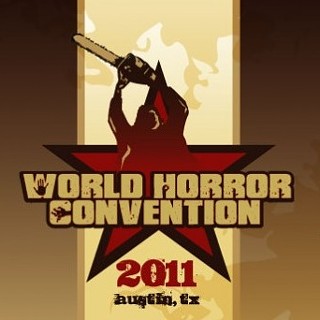Things Not To Fear: 1) The Reaper, 2) The World Horror Convention in Austin
An Interview with Convention co-chairs Nate Southard and Lee Thomas
By Wayne Alan Brenner, 12:45PM, Wed. Apr. 27, 2011
As promised yesterday, here's that interview with Nate Southard and Lee Thomas, the co-chairs of the annual World Horror Convention that's invading – like some chthonic force rising up from the depths, perhaps? – our sun-baked gotham this weekend.
Austin Chronicle: How is it that the World Horror Convention happens to be taking place in Austin this year, and how did you guys get involved with it?
Nate Southard: We’d both been attending the annual convention for a while – I started going back in 2006, Lee started going before that. And we'd both seen good conventions and bad conventions. We watched how they were run and how informative some of them are. And Lee had been living in town for about two years, and I’ve been here for about ten, and we’d just gotten back from a convention in Salt Lake City, the 2008 World Horror Convention, and we started kicking around ideas of submitting a bid to bring it here. It took us about a year and a half to get all our ducks in a row, but eventually we set up the bid and got a pretty great guest-of-honor slate, and the World Horror Society – who’s in charge of the whole thing – signed off on it, and that pretty much brings us to present.
AC: Who were the competitors, the other cities vying for … ?
Lee Thomas: That we don’t know. It’s sort of a blind bid system. You send in the bid about how you see the con, who your guests of honor are going to be, the different events you’ve planned. You send it all in to the Society in a formal – well, ours may have been over-formal. I have a background in PR and event management, so I was a little anal about the way I presented the thing to them. And we heard back relatively quickly. We had a couple of our guests of honor signed on before this even got off the ground, so that helped us.
AC: And who was that?
Thomas: Initially we had Joe Hill and Sarah Langan, and they’re both big, big names now. They’re relatively new; they’ve been around for three to five years as far as prominence, but they’re just gonna keep going up.
AC: Is the convention mostly about literary horror, or cinematic, or … ?
Southard: It’s much more of an author con than a filmmaker con. We’re going to have a few screenings, a couple of short films, a movie that was adapted from one of our grandmaster’s novels. But, for the most part, it’s about the prose work, trying to promote authors both new and established.
AC: This is the first time the World Horror Convention’s been in Texas, right? So where was the last one?
Southard: Brighton, UK.
AC: Does it go all over the world?
Thomas: Brighton was the first time it was off North America. It’s been in Canada several times, but it’s primarily been in the US. And last year was the biggest World Horror Convention they’ve had, because everybody in Europe finally had the chance to go to it. And they just did a terrific job, so hopefully they’ll look into do more overseas. It’s a great opportunity for everybody involved, but it’s hard to find people who want to take it on, there’s a lot of hard work involved. And every now and then somebody says “Oh, I’d like to do that,” and then they may get awarded the bid, but they don’t know what they’re in for. I’ve run into people who’ve put conventions together – not this particular one – but, by the end of it, they’re just pulling their hair out and are absolutely crazy, they had no idea what to expect. At least with our bid, I’ve worked with World Horror in New York when I was there, and I’ve worked on some other events in the genre and outside the genre, so I sort of had an idea of what to expect. Although Nate was the one who kept saying “We should have World Horror in Austin.”
Southard: I had no idea what I was in for.
Thomas: And I started sending him all this information about what we need to do and how we need to do it, and his eyes glazed over.
AC: Is it eating y’all’s schedule alive, monsterwise?
Southard: Yes, very much so.
Thomas: The only writing I’ve gotten done is for my MFA program – I went back to school, to Vermont College of Fine Arts. It’s a low-residency program, so I go there for two weeks each semester, get loaded up, and do a lot of the work via email. And that’s the only writing I’ve gotten done in the last couple of months, because everything’s been focused on the con.
Southard: I used to wake up at 4:30 in the morning and get about an hour and a half of writing done before work, and now that’s spend processing registrations and sending off emails, dealing with what needs to be dealt with. I can’t remember the last time I got an original word out.
Thomas: People can’t always talk about this stuff at work or with their families. A lot of times people just don’t get it. But you go to the con and suddenly it’s like you’ve got four hundred of your best friends sitting around talking about horror, y’know?
Southard: For a lot of us, it’s the one weekend a year where we can sort of function as a society, where we’re not all the quiet people standing in the corner wondering how to start a conversation. We can actually figure that out in this circle.
Thomas: The wallflowers become a weed species.
AC: So both of you guys write?
Southard and Thomas: Yes.
AC: And when did you get started on that? How old were you when you thought, “Oooh, I’m gonna write some fuckin’ horror.” Although, ah, you might not have phrased it quite like that.
Thomas: I was in third grade, but I don’t think that counts. I was basically breaking copyright on the universal classics. And I just wrote as a hobby. That’s what I did when my friends were playing video games or going out to the movies and whatnot. I didn’t even try to start publishing until about ten years ago.
Southard: Pretty much the same story for me, but I’d gone about it from a different angle. In middle school and high school, I always wanted to write comic books for a living. And through high school and college, that morphed into wanting to be a screenwriter. And I came down here and went to RTF at UT. Very odd, getting a screenwriting degree from a documentary school. But, by the time I graduated, mostly by reading and picking up on some authors that I hadn’t really heard of before, I found this new fascination with prose. And I’ve really been trying to focus on prose for about seven years now.
AC: So you moved here for UT. Lee, why did YOU move to Austin?
Thomas: Just to be out of New York. I’d been living there for a number of years, and I was there on business. And after I started selling books, I could kind of be wherever I wanted to be.
AC: What drew you guys to horror as opposed to the literary-fiction genre or sword & sorcery or something like that?
Southard: It’s just what I’ve always liked to read. Some of the first prose I remember was Stephen King’s collection Night Shift. And for the longest time I couldn’t actually read his novels, because they just took so long to get going, but maybe that’s because I was just a smart-ass little kid. But his short stories always fascinated me.
Thomas: I read anything I could get my hands on when I was a kid, and when I was nine or ten I picked up a copy of The Exorcist, because my parents had it in the house. I picked it up and read it and I was just ...it was stuff I understood at that age. And I remember that I put down the book, and I was walking out of my bedroom, and my mother was standing at the end of the hall. And just the way the light hit, she was in silhouette, and I … I freaked. I mean, it was just this terrifying moment. And yet, on some level, I dug it. So I just kept reading, trying to find something like that again.
AC: Are there obscure horror writers – not new ones who are just starting out, but classic writers – who you would recommend to people who might not have heard of them?
Southard: I think the big one for me would be Jack Ketchum. In some circles, he’s pretty well known. But he hasn’t really had a huge break-out, he hasn’t really crossed over yet.
Thomas: And he’s our grandmaster for the convention. Stephen King loves him, he’s always mentioning the guy’s work in interviews, and during his National Book Award acceptance speech, King mentioned Jack Ketchum. He’s a phenomenal writer. He’s very much from a literary background, but he deals with things that are so unpleasant, so difficult for people, that I think they take the warning seriously when someone says “You may not want to read this, because blah-blah-lah.” Sometimes that’s considered a challenge. But with Ketchum, people are very serious about it: It’s difficult work for people to get their heads around, it’s extreme stuff. But it’s so well done.
Southard: He wrote my favorite book, but it’s a book I can’t read a second time.
AC: What book is that?
Southard: The Girl Next Door.
Thomas: They made a movie out of that about three years ago. And it’s very disturbing stuff.
AC: So what all goes on at the convention? What can a person attending it look forward to?
Southard: We’ve got four days of panels that are very educational and informative, a lot of good facts and opinions going on there. We’ve got four days of readings from, like, at least 30 of the authors who will be there.
Thomas: The readings will be from brand new people who are just now emerging, all the way through to established bestsellers like Peter Straub and F. Paul Wilson.
Southard: Saturday night, we’ll be having a mass author signing at 7 or 7:30, and that’s actually open to the general public, you won’t need a membership or a badge to get in. Pretty much every author we have at the convention will be in one of the ballrooms.
AC: Do y’all make a living solely from your writing these days?
Southard: I do not, no. [He sighs.] I’m still working a day job.
Thomas: I am. I can’t say it’s a terrific living, but, yeah. I’ve been doing that for about six years now.
AC: Have you done that with just books, or have you had things optioned for movies as well?
Thomas: I’ve not made that jump yet. I’ve had producers who, well, they contact you every time you have a positive Publisher’s Weekly review, and then you never hear from them again. Or they want to talk to your film agent, so you send them to your film agent, and then you never hear from them again.
AC: Are there sub-genres of horror that y’all are particularly drawn to, like splatterpunk or ghost stories or true crime?
Southard: I find most of the best horror coming out right now to be marketed as more of the crime genre. Gillian Flynn’s two books, Ken Bruen’s American Skin, those are – you find them in the mystery section, but they’re horror.
Thomas: I prefer the supernatural work – except in the case of Jack Ketchum, which is all real-world based – it’s more fun for me when I’m writing, and when I’m reading it’s more enjoyable to see somebody bring something new to it.
AC: And where does, ah, Shirley Jackson fit in with y’all?
Thomas: Well, I’m one of the judges for the Shirley Jackson Award this year, so … [laughs] She’s brilliant.
Southard: She’s a cornerstone; there’s no denying that.
Thomas: Absolutely amazing work. Very creepy, very understated, everything you need to know is right there.
AC: What do you guys think of the – not intentionally, necessarily, by any one organization – but the mass marketing of, the pop-culture force that is HP Lovecraft, these days?
Thomas: I think it’s great, in a lot of ways. Because he was overlooked, but now people are starting to get it. And I think a lot of it has to do with where we’re at culturally, now. A lot of people are feeling pressed-in by these indifferent forces. Whether it's the government or their jobs or whatever, there’s a lot of that in our society right now. But I think people also realize, on some level, “It’s not just about me,” so they get into this idea that all of these forces that they can’t control are affecting them. And Lovecraft was all about that. The Elder Gods are wreaking havoc, but we don’t know it. We either don’t know it, or we come to realize that they don’t care about us: They’re not here to hurt us or do anything with us in particular, they’re just walking through, and we’re getting stomped on. And I think that’s coming out in fiction right now, a lot of great writers like Laird Barron and Wilum Pugmire.
Southard: Some John Langan stuff.
Thomas: There’s this whole undercurrent – many of them are British – none of the three we just mentioned are – but there’s this whole British movement, a very strong current of that, just waiting to break out. So maybe that’s what will follow the zombie trend, I don't know.
Southard: Just … no more mash-ups.
AC: Mash-ups?
Southard: Like Pride and Prejudice and Zombies.
Thomas: A classic novel, with some horror thing thrown on top of it.
Southard: Sense and Sensibility and Sea Monsters.
Thomas: Yeah, we really want all that to go away.
AC: Candide and Cthulhu.
Thomas: There you go, that’ll be the next one. Dibs on the title.
[laughs]
AC: Okay, here’s a question: Out of everything in this world – and beyond – what’s the ultimate horror?
Thomas: "What’s the ultimate horror?" [He looks around the cafe we're sitting in.] All of these people that we don’t know.
Southard: I’d actually go with people, too.
Thomas: We’re capable of so many wonderful things, but, oh, the other side of that, the horrible, horrible things we’re capable of. Usually, when you’re dealing with supernatural fiction, you’re looking at the same sorts of dynamics, you’re just putting a monster in the place of a social entity or an actual person. And you’re trying to work through some of those things, like "How does someone actually do this to another person?" Really, that’s what scares me most: What people are capable of.
Southard: And there seems to be, maybe from people outside the genre, they’ll read something that Lee will write, or that I’ll write, and, well – my own mother, after she read my first book, she actually called and asked if there was anything wrong, if there was anything I wanted to talk about, and like that. We don’t write these things because we’re damaged in some way, we write them because we’re genuinely trying to find the answer to how some of these things can happen.
Thomas: I think some of us are really damaged. I mean, you can’t make a blanket statement one way or the other, about any group of people.
Southard: Oh, I’ll make blanket statements all the time.
A note to readers: Bold and uncensored, The Austin Chronicle has been Austin’s independent news source for over 40 years, expressing the community’s political and environmental concerns and supporting its active cultural scene. Now more than ever, we need your support to continue supplying Austin with independent, free press. If real news is important to you, please consider making a donation of $5, $10 or whatever you can afford, to help keep our journalism on stands.
Richard Whittaker, April 27, 2011
March 22, 2024
March 22, 2024
World Horror Convention, Nate Southard, Peter Straub, Jack Ketchum, Joe Hill, Stephen King, Sarah Langan, Lee Thomas, F. Paul Wilson, Shirley Jackson, Cthulhu, H.P. Lovecraft, Gillian Flynn, Ken Beuen, John Langan, Laird Barron, Wilum Pugmire, Pride and Prejudice and Zombies











